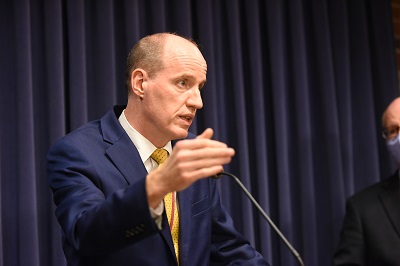 SPRINGFIELD – State Senator Bill Cunningham, who has been deeply involved in negotiations on a piece of legislation meant to spark Illinois’ renewable energy sector and preserve and create tens of thousands of jobs, celebrated the measure’s final passage through the General Assembly.
SPRINGFIELD – State Senator Bill Cunningham, who has been deeply involved in negotiations on a piece of legislation meant to spark Illinois’ renewable energy sector and preserve and create tens of thousands of jobs, celebrated the measure’s final passage through the General Assembly.
“This ambitious plan would make Illinois a national leader in fighting climate change and creating jobs in the clean energy economy,” said Cunningham, a Democrat who represents portions of Chicago and the southwest suburbs. “This legislation has been years in the making, and I want to thank both the labor and environmental communities for their passion and dedication in getting it across the finish line.”
The legislation, Senate Bill 2408, sets an ambitious goal of transitioning Illinois’ electric generation to 100% clean energy by 2050 and 50% renewable energy by 2040. It creates a firm schedule requiring coal, oil, and gas-based power plants to close or repurpose, addressing a major contributor to global warming. In order to reach these goals, it more than doubles the state’s budget for renewable energy, creates new workforce training programs, and allows for the construction of two renewable energy transmission lines.
In the short term, it provides funding to keep Illinois’ nuclear plants open, helping preserve thousands of jobs and ensuring that they aren’t replaced with fossil fuel-burning plants that would contribute to climate change.
To further fight global warming and create good-paying jobs, the measure also includes incentives to expand the adoption of electric vehicles and improve energy efficiency in homes. For example, it expands the low-income weatherization program and allows customers to finance energy efficiency projects through their utility providers.
“This plan will make the Illinois electrical grid renewable, reliable, and affordable,” Cunningham said. “It addresses our limited reserves of fossil fuels before prices start to sky-rocket, and it helps create a more reliable electric grid, preventing blackouts.”
To protect consumers and address the criminal activity of ComEd, the measure would also formally empower the Illinois Commerce Commission to investigate any utility company convicted of criminal activity to determine if it misused customer money. If the ICC finds that ComEd has squandered its customers’ money for illegal activities, it would be able to enforce penalties that include forcing the troubled company to return money to its customers. The measure also creates a state utility watchdog to oversee utility companies’ own internal controls and prohibits charging low-income customers late fees.
The measure now goes to the governor, who has pledged to sign it.



